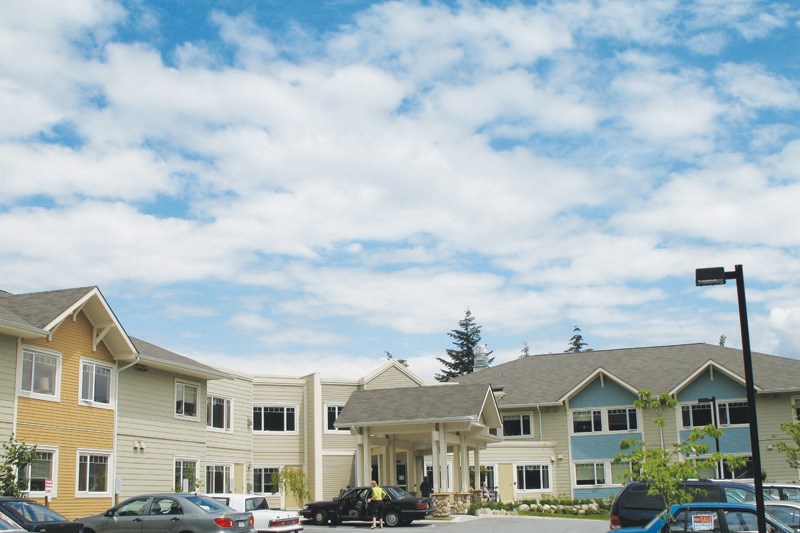There are a plethora of housing choices for seniors living on the Sunshine Coast — depending on the person’s mobility, health and income. The options are almost limitless. However, that’s not to say all needs are being fulfilled. In fact, many are left wanting.
In addition to the already defined criteria, seniors housing on the Coast can be divided into two streams, private and public. Each has its strengths and weaknesses. In our look at the housing realities, all five points have to be considered.
Independent living, the most popular choice for seniors everywhere, has some challenges on the Coast.
Jill Hightower is a senior many would consider fortunate. She lives with her husband Henry in a small, single-level house with a fenced yard close to public transportation. Both Hightowers have decent pensions and are able to keep their precious pooches.
For them the move from Secret Cove to their present home five years ago was a good one.
“[Our home] maintains our independence in the community. This is very important to us,” Jill said.
But a quick look through the rentals and real estate shows that small, single-family homes are at a premium. For many people looking or needing to downsize, the choices rapidly become limited.
Concerns run from being able to sell their current property and how secure the new property is to what to do with their four-legged friend they consider part of their family.
The current real estate market is presenting a challenge for seniors who may be land rich but cash poor. The taxes on a waterfront home can pose a huge problem for people who may have retired many years ago with small or non-existent pensions. In some cases, the surviving partner in a long marriage, frequently a woman, may have no source of income beyond Canada’s Old Age Security Pension. In order to purchase or rent a more affordable home, the owner must sell their current property. With the sweet spot for realty sales being $400,000 and under, quick sales of waterfront homes are presently a pipe dream.
There are several 55-plus housing complexes on the Coast. They’re all townhouses, condos or apartments. Most employ standard security features such as gates and intercoms. Where many fall short is in the pet department. While several allow cats and dogs, according to Adam Major of Holywell Properties, which handles both sales and rentals, most complexes have limits on species, number and/or size of allowable critters. Those are not easy rules to get around.
“Where once if someone said, ‘my dog is a couple of pounds over the limit’ we would have ignored it. That doesn’t happen anymore,” he said.
Major also pointed out that most strata buildings have rental restrictions. So a senior with sudden health problems necessitating a move to other housing may be caught in a real bind if they’re not able to rent out their home.
One of the best ways to deal with the sudden change scenario is a private campus of care. That type of housing allows seniors to age in place. Right now the Christenson Village complex in Gibsons is the only housing of that form on the Coast. And it is under the Vancouver Coastal Health (VCH) authority and requires an appraisal by VCH in order for a senior to qualify to live there.
Coun. Lee Ann Johnson of Gibsons, a long-time housing advocate, has had personal experience with the benefits of the campus of care. Her parents lived in just such housing in Salem, Ore. At each different stage in their older years, the couple was able to retain the same general surroundings and group of friends.
“It was a multi-care complex run by the Baptists. The first stage was a one-storey bungalow. The residents had their own little gardening beds and patios. They could grow flowers and veggies. The rest was taken care of by gardeners. It was a reasonable rate. There were options including evening dinner, recreation facilities, continental breakfast, and every two weeks there was a change of linens and light dusting,” Johnson said.
Once their needs changed, the duo, retired teachers, moved to an apartment in the same complex. There they had full meals in the dining room, with the same friends they had had for many years, and a nurse dispensed medication.
“In another stage in the facility there was nursing care 24/seven. But needing it didn’t mean you were doomed to be there forever. My dad had to be in the hospital for a serious health problem and he needed complex care for a time. Once his health problem cleared up, my parents went back to their apartment. One of the beauties of the program was the attention to social functioning. There were opportunities to talk to others; they were fed with others. It was the highlight of their day,” she said.
“It was such a gift. I didn’t have to travel eight hours to make sure my parents were OK,” she added.
Johnson is a strong advocate for people aging in place. She thinks the addition of a round-the-clock nursing station in Gibsons would clear the way for more seniors to be able to stay in their own homes there. That way people would not have to make the journey to the hospital in Sechelt for relatively minor health issues if they had a medical professional who could allay their fears. The councillor also said friendship plays an enormous role in how successfully we age.
“When we share and see our human frailties and demonstrate kindness and care for each other, life can be normalized to the maximum — even when life really isn’t all that normal,” Johnson said.
Editor’s note: See part two of this story in the Aug. 22 edition.



